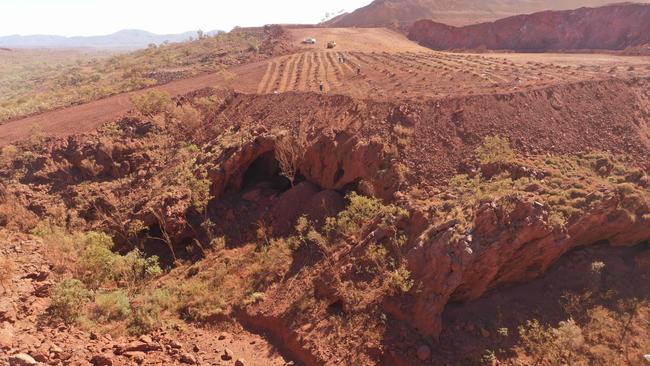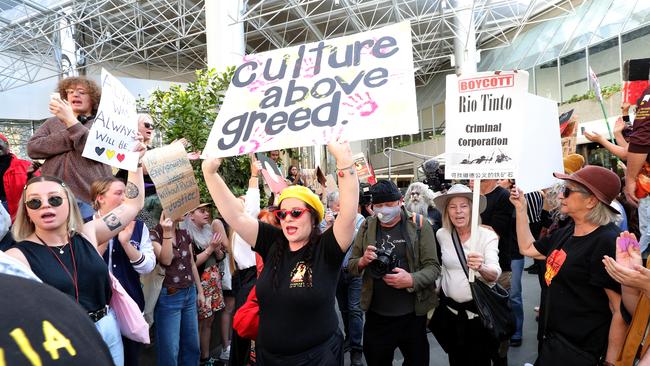‘Bare minimum’: indigenous groups criticise Rio Tinto bid to rebuild trust after Juukan Gorge disaster
Rio Tinto is doing the ‘bare minimum’ to rebuild trust after it blasted ancient WA rock shelters, say some traditional owners.

Traditional owners in Western Australia’s Pilbara have criticised Rio Tinto’s progress in improving its relationship with indigenous groups, with one saying it believed the miner was doing “the bare minimum” following the destruction of the Juukan Gorge rock shelters last year.
The comments are contained in a recent anonymous survey of 10 Pilbara traditional owner entities conducted by the global miner as part of a new report on the progress of its efforts to improve its community and social performance practices.
The demolition of the culturally and archaeologically significant shelters – which had evidence of almost 50,000 years of continual human habitation – was done to expand Rio’s Brockman Mine.
It was later revealed the miner had alternative options to preserve the site, but it did not inform its traditional owners, the Puutu Kunti Kurrama and Pinikura people, of those alternatives.
The fallout of the event damaged Rio’s relationship with traditional groups, led to the acceleration of an overhaul of WA’s indigenous heritage protection laws and resulted in the resignation of CEO Jean-Sébastien Jacques and other executives.
Current Rio Tinto chief executive Jakob Stausholm said the miner would prioritise listening to indigenous groups to rebuild trust.
“We know that we cannot change the past. But we can continue to seek out, listen to and respect different voices and perspectives, to ensure that in the future, cultural heritage sites of significance are treated with the care they deserve,” he said.
Rio’s survey of the Pilbara Groups asked groups of four to give their opinion on five commitments made by the company emerging from its board review of cultural heritage management.
Although the surveyed groups had high opinions of the commitments, their reaction to their implementation was mixed to negative.
Rio’s commitment to modernise its agreements with traditional owners through steps like removing gag clauses that stopped them speaking out about cultural heritage received three 10 rankings.
However, the group’s implementation of the commitment received scores of one to five.

“We believe that Rio Tinto is still doing the bare minimum required to recover its reputation,” one group said.
“The workshop approach proposed by Rio Tinto has not been accepted by the group (tired of talkfests),” said another.
“The involvement of lawyers in negotiations is also not appreciated. The engagement protocol proposed by Rio Tinto was also seen as overly legalistic and restrictive.”
The groups similarly reacted positively to Rio’s commitment to increase indigenous employment and leadership in the company, with Rio recently boosting its indigenous manager count from six to 19.
However, its implementation attracted middling scores and one seven.
“Out of the 19 people across Australia – what position are the indigenous people working in? Do they have a position of power?” one group asked.
A company push to increase cultural competency of Rio employees and contractors through connection with local Indigenous people was backed by the groups, but opinions of its implementation were highly stratified.
“Great engagement with traditional owner groups and great product. Being well received,” one group said.
“Up until now Rio Tinto has engaged more with one of our groups over the other, could look to work directly with our corporation for cultural competency training,” said another.
Rio’s move to boost the capabilities and resources of the internal cultural heritage teams was applauded, with the miner’s iron ore cultural heritage team growing to over 60 people, but some groups complained of a lack of engagement and outcomes.
The pending establishment of an Australian advisory group to “ensure Rio Tinto has a better understanding of indigenous culture and issues in Australia” received a mixed reaction, with groups requesting increased face-to-face consultation.
“The Rio Tinto board needs to engage directly with its traditional owner stakeholders. It is about establishing relationships,” a group said.
Rio Tinto said the advisory group will commence in the first quarter of 2022 with a minimum of 60 per cent Aboriginal or Torres Strait Islander membership and an indigenous Australian chairperson.

To join the conversation, please log in. Don't have an account? Register
Join the conversation, you are commenting as Logout